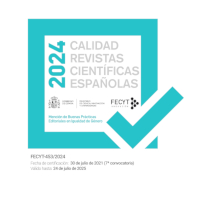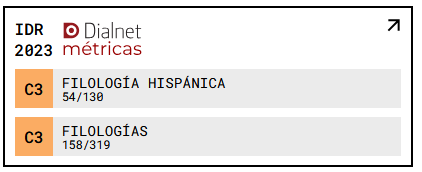E-lexicography and the design of pedagogically oriented specialized dictionaries: the Diccionario de comercio internacional español-inglés
DOI:
https://doi.org/10.18172/cif.2552Keywords:
Function Theory of Lexicography, learner’s dictionary, user/student, lexicographically relevant needs, social or extralexicographic situation, lexicographically relevant dataAbstract
The present article represents a part of a more comprehensive project which entails the proposal for the elaboration of an International Trade Dictionary inside the theoretical framework of the Functional Theory of Lexicography. This project, which will be presented as a Ph dissertation, proposes the creation of a specialized electronic pedagogical dictionary in English and Spanish for Spanish university students.We present here the summary of all those sections in the study which focus on the pedagogic approach of the proposed reference tool. Specifically: the selection of information categories and the elaboration of two structural elements (Systematic Introduction and User’s Guide) considered to be highly relevant for the user. After a brief overview of the state-of-the-arts, we summarize the theoretical framework where our proposal of a dictionary is included. Next, we state the pedagogical facts that justify our work and our objectives together with a list of the information categories and structural elements considered as relevant for our target user. Finally, we present a set of illustrations showing the possible layout for the dictionary interface in different phases of the search process.Downloads
References
ANDERSEN, B. y FUERTES-OLIVERA, P. A. (2009). “The Application of Function Theory to the Classification of Monolingual Business Dictionaries”. Lexicographica 25, 213-239.
ANDERSEN, B. y ALMIND, R. (2011). “The Technical Realization of Three Monofunctional Phrasal Verb Dictionaries” en E-Lexicography. The Internet, Digital Initiatives and Lexicography. (Ed. P. A. Fuertes-Olivera y H. Bergenholtz). Londres: Continuum.
Base de datos terminológica de la OMC. <http://wtoterm.wto.org/multiterm/index.mto?locale=en>. (Acceso: marzo, 2012).
BERGENHOLTZ, H., NIELSEN, S. y TARP, S. (2009). Lexicography at a Crossroads. Dictionaries and Encyclopedias Today, Lexicographical Tools Tomorrow. Berna: Peter Lang.
BERGENHOLTZ, H. y NIELSEN, S. (2006). “Subject-field components as integrated parts of LSP diccionaries”. Terminology 12 (2): 281-303.
BERGENHOLTZ, H. (2011). “Access to and Presentation of Needs-Adapted Data in Monofunctional Internet Dictionaries” en E-Lexicography. The Internet, Digital Initiatives and Lexicography. (Ed. P. A. Fuertes-Olivera y H. Bergenholtz). Londres: Continuum.
BERGENHOLTZ, H. (2012). “Concepts for monofuctional accounting dictionaries”. Terminology 18 (2): 243-263.
BERGENHOLTZ, H. y TARP, S. (2005a). ”Wörterbuchfunktionen” en Schreiben, Verstehen, Übersetzen, Lernen. Zu ein- und zweisprachigen Wörterbüchern mit Deutsch. (Ed. I. Barz, H. Bergenholtz y J. Korhonen). Frankfurt am Main: Peter Lang.
BERGENHOLTZ, H. y TARP, S. (2005b). “Electronic dictionaries: Old and new lexicographic solutions”. Hermes. Journal of Linguistics 34: 7-9.
BERGENHOLTZ, H. y TARP, S. (2004). “The concept of dictionary usage”. Nordic Journal of English Studies 3: 23-36.
BERGENHOLTZ, H. y TARP, S. (2003). “Two opposing theories: On H.E. Wiegand’s recent discovery of lexicographic functions”. Hermes. Journal of Linguistics 31: 171-196.
BOTHMA, T. J. D. (2011). “Filtering and Adapting Data and Information in an Online Environment in Response to User Needs” en E-Lexicography. The Internet, Digital Initiatives and Lexicography. (Ed. P. A. Fuertes-Olivera y H. Bergenholtz). Londres: Continuum.
FERNÁNDEZ, T. y FABER, P. (2011). “The Representation of Multidimensionality in a Bilingualized English-Spanish Thesaurus for Learners in Architecture and Building Construction”. International Journal of Lexicography 24 (2): 198-225.
FL: WIKIMEDIA FOUNDATION (2004): Wikipedia: The free encyclopedia. <http://www.wikipedia.org>. (Acceso: marzo, 2012).
FL: WIKIMEDIA FOUNDATION (2004): Wiktionary: The free dictionary. <http://www.wiktionary.org/>. (Acceso: marzo, 2012).
FUERTES-OLIVERA, P. A. (2010). “Lexicography for The Third Millennium: Free Institutional Internet Terminological Dictionaries for Learners” en Specialised Dictionaries for Learners. (Ed. P. A. Fuertes-Olivera). Berlin: De Gruyter.
FUERTES-OLIVERA, P. A. y BERGENHOLTZ, H. (eds.) (2011). E-Lexicography. The Internet, Digital Initiatives and Lexicography. Londres: Continuum.
FUERTES-OLIVERA, P. A. y TARP, S. (2011). “Lexicography for The Third Millennium: Cognitive –oriented Specialised Dictionaries for Learners”. Iberica. Journal of the European Association of Languages for Specific Purposes 21.
FUERTES-OLIVERA, P. A. y TARP, S. (2014). Theory and Practice of Specialised Online Dictionaries: Lexicography versus Terminography. Berlin: De Gruyter.
FUERTES-OLIVERA, P. A. y ARRIBAS-BAÑO, A. (2008). Pedagogical Specialised Lexicography. The representation of meaning in English and Spanish business dictionaries. Amsterdam/Philadelphia: John Benjamins. (Terminology and Lexicography in Research and Practice, 11).
FUNDACIÓN BBVA (2010). Estudio internacional Fundación BBVA sobre estudiantes universitarios de seis países europeos. <http://www.fbbva.es/TLFU/dat/resultados_universitarios_2010.pdf>. (Acceso: 3 noviembre 2011).
GOUWS, R. H. (2011). “Learning, Unlearning and Innovation in the Planning of Electronic Dictionaries” en E-Lexicography. The Internet, Digital Initiatives and Lexicography. (Ed. P. A. Fuertes-Olivera y H. Bergenholtz). Londres: Continuum.
HALBACH, A., LÁZARO, A. PÉREZ GUERRA, J. (2010). “La acreditación del nivel de lengua inglesa en las universidades españolas”. <http://www.revistaeducacion.mec.es/doi/362_154.pdf>. (Acceso: 8 noviembre 2012) y <http://www.britishcouncil.org/spain_informe_acreditacion_ingles_universidades_espanolas.pdf>. (Acceso: 8 noviembre 2011).
HEID, U. (2011). “Electronic Dictionaries as Tools: Toward An Assesment of Usability” en E-Lexicography. The Internet, Digital Initiatives and Lexicography. (Ed. P. A. Fuertes-Olivera y H. Bergenholtz). Londres: Continuum.
IATE: Base de datos terminológica para la Unión Europea. <http://iate.europa.eu/iatediff/SearchByQuery.do> (Acceso: marzo, 2012).
LANDAU, S. I. (2001). Dictionaries: The Art and Craft of Lexicography. Cambridge: Cambridge University Press.
LEW, R. (2011). “Online Dictionaries of English” en E-Lexicography. The Internet, Digital Initiatives and Lexicography. (Ed. P. A. Fuertes-Olivera y H. Bergenholtz). Londres: Continuum.
LEW, R. y GALAS, K. (2008). Can Dictionary Skills Be Taught? The Effectiveness of Lexicographic Training for Primary-School-Level Polish Learners of English. <http://www.staff.amu.edu.pl/~rlew/pub/>. (Acceso: 3 noviembre 2011).
NIELSEN, S. y ALMIND, R. (2011). “From data to dictionary” en E-Lexicography. The Internet, Digital Initiatives and Lexicography. (Ed. P. A. Fuertes-Olivera y H. Bergenholtz). Londres: Continuum.
NIELSEN, S. y TARP, S. (eds.) (2009). Lexicography in the 21st Century. In Honour of Henning Bergenholtz. Amsterdam: John Benjamins. (Terminology and Lexicography in Research and Practice, 12).
NIELSEN, S., MOURIER, L. y BERGENHOLTZ, H. (2003-2007). Accounting Dictionaries: Danish Accounting Dictionary; English-Accounting Dictionary; Danish-English Accounting Dictionary; English-Danish Accounting Dictionar. <http://www.regnskabsordbogen.dk/> (Acceso: marzo, 2012).
NIELSEN, S., MOURIER, L., BERGENHOLTZ, H., FUERTES OLIVERA, P., GORDO GÓMEZ, P., NIÑO AMO, M., RIOS RODICIO, A. DE LOS, SASTRE RUANO, A., TARP, S.,VELASCO SACRISTÁN, M. (2009). El Diccionario Inglés-Español de Contabilidad. <http://www.lemma.com> (Acceso: julio, 2013).
TARP, S. (2010). “Functions of Specialised Learners' Dictionaries” en Specialised Dictionaries for Learners. (Ed. Pedro A. Fuertes-Olivera). Berlin: De Gruyter.
TARP, S. (2008). Lexicography in the Borderland between Knowledge and Non-Knowledge. General Lexicographical Theory with Particular Focus on Learner’s Lexicography. Tübingen: Niemeyer.
VERLINDE, S. (2011). “Modelling Interactive Reading, Translation and Writing Assistants” en E-Lexicography. The Internet, Digital Initiatives and Lexicography. (Eds. P. A. Fuertes-Olivera y H. Bergenholtz). Londres: Continuum.
Wordreference.com: diccionarios de español, ingles, francés y portugués. <http://www.wordreference.com/>. (Acceso: marzo, 2012).
ZGUSTA, L. (1971). Manual of lexicography. The Hague: Mouton. (Janua Linguarum. Series maior, 39).
Downloads
Published
How to Cite
Issue
Section
License
The authors retain copyright of articles and authorize CIF the first publication. They are free to share and redistribute the article without obtaining permission from the publisher as long as they give appropriate credit to the editor and the journal.
Self-archiving is allowed too. In fact, it is recommendable to deposit a PDF version of the paper in academic and/or institutional repositories.
It is recommended to include the DOI number.
This journal is licensed under a Creative Commons Attribution 4.0 International License














